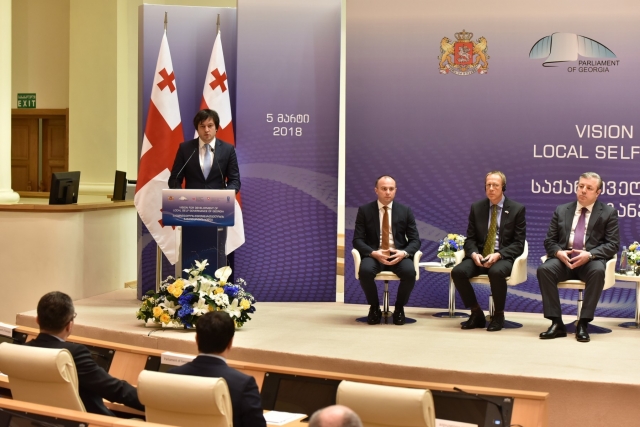Georgian Dream Pledges More Decentralization by 2025
In his presentation of the National Vision of Local Self-Governance and Decentralization in Georgia, Georgian Parliament Speaker Irakli Kobakhidze announced yesterday that the funding of the local self-government will increase to 7% of GDP by 2025.
The corresponding action plan and reform strategy will entail better local governance, fiscal decentralization and a gradual increase of the powers of self-governing bodies. It will be developed by Parliament in 2018, with UNDP, Swiss and Austrian financial technical support.
“Our ultimate goal is to become a full-fledged member of the European family, and it won’t be possible unless we establish a European system of decentralized governance,” Kobakhidze said, also underlining the need for developing “a unified, complex decentralization strategy.”
Kobakhidze stressed that the upcoming reform would be implemented with the close cooperation of civil society organizations, experts and the National Association of Self-Governments. He further emphasised the importance that “political will” plays in the reform process, thanking the Prime Minister to that end.
The Prime Minister, another presenter on the reform plans, said that “regions should be entitled to make their own decisions; they should possess sufficient resources to make the decisions and enforce them.”
Kvirikashvili also noted “serious challenge” posed by economic inequality across the country, an issue that would be addressed through the self-government reform. “Highly educated youth will be interested to get involved in local self-governance, thus promoting regional development,” he said.
Georgian Dream had launched the local self-government reform several years ago. Parliament adopted the Self-Government Code in 2014, paving the way for direct elections of municipal mayors and gamgebelis (executives), leading to an increase in the number of self-governing cities from five to twelve.
However, last year, the Parliament approved amendments to the Local Self-Government Code, which reduced the number of self-governing cities back to five, triggering strong criticism from civil society organizations and the opposition.
Last December, Kvirikashvili spoke of the government’s intentions to carry out a new wave of the self-government reform during his parliamentary confidence vote hearings.
Photo source: Parliament.ge
By Máté Földi












